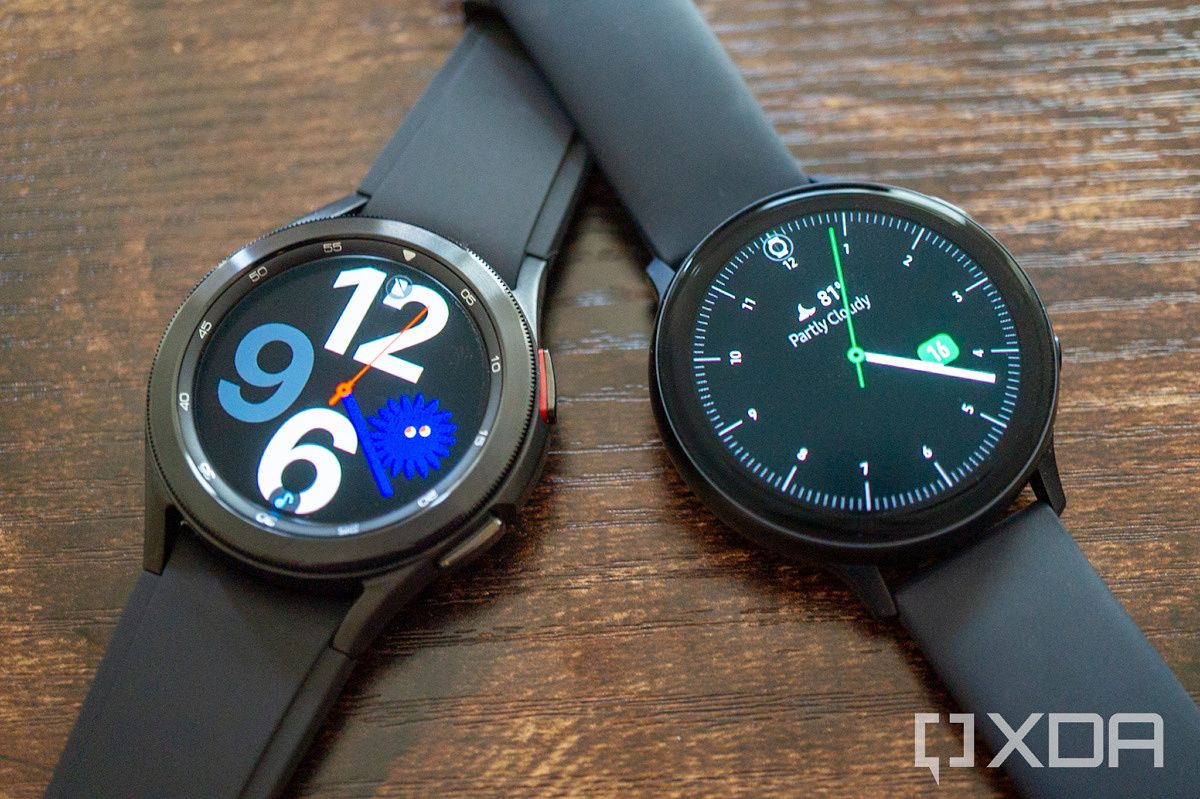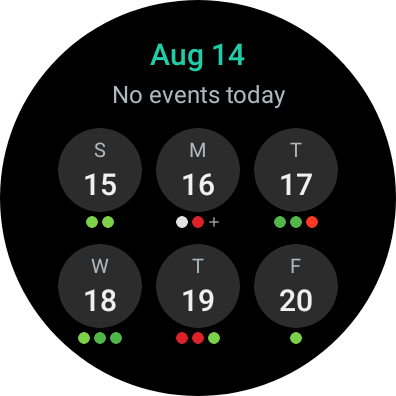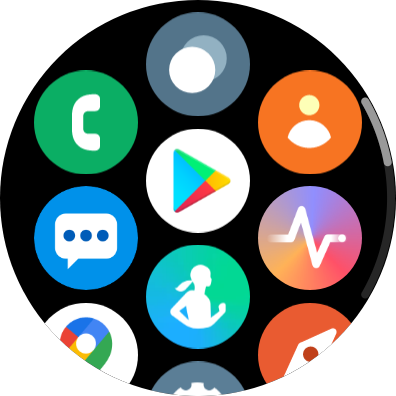Even though Samsung and Google have worked together on phones and tablets for years, the same isn’t true with wearables. Samsung only released one watch with Google’s wearable software (then called Android Wear), the Gear Live, and every wearable device after that used Samsung’s own Tizen platform. Even though Tizen has been a more polished experience than Wear OS in most areas, the only company ever producing Tizen watches was Samsung, which hasn’t led to much app development. Meanwhile, Wear OS has stagnated due to poor hardware and the same lack of software development.
Earlier this year, Samsung and Google announced they were teaming up on wearable devices. Samsung promised to switch its smartwatches over to Wear OS, while contributing code and other resources to the platform, and Google would actually start investing in the platform with new apps and services. The partnership might also open the door for other Wear OS watches to use Samsung’s Exynos chips, but those haven’t materialized yet.
The first product of this partnership is the Samsung Galaxy Watch 4, available in both modern and “Classic” styles — I received the latter from Samsung. The Galaxy Watch 4 is the first watch to run Wear OS 3, paired with the brand-new Exynos W920 chipset and other high-end internal hardware. There’s plenty to be excited about, but is the Galaxy Watch 4 actually a good smartwatch, especially compared to the Apple Watch Series 6? Read on to find out, and if you’re buying one, we have a roundup of the best watch bands.
Galaxy Watch 4 Classic Specifications
| Specification | Samsung Galaxy Watch 4 Classic |
|---|---|
| Sizes | 42mm and 46mm |
| Dimensions & Weight |
|
| Display |
|
| SoC | Exynos W920 (5nm) |
| RAM & Storage |
|
| Battery & Charging |
|
| Sensors | Accelerometer, Barometer, Gyro, Geomagnetic, Light, Samsung BioActive Sensor |
| Connectivity | LTE, Bluetooth 5.0, Wi-Fi 802.11 a/b/g/n 2.4+5GHz, NFC, GPS/Glonass/Beidou/Gallileo |
| Durability |
|
| Software |
Wear OS 3 with One UI 3 |
About this review: I received the 42mm Galaxy Watch 4 Classic on loan from Samsung USA. Samsung had no editorial input on this review.
Design and hardware
Samsung already sold two different styles of smartwatches: the sleek Galaxy Watch Active and the more traditionally-designed Galaxy Watch. This year, the company is updating both designs at the same time, so you’ll get the same internal hardware no matter which one you go with. I received the Galaxy Watch 4 Classic in the smaller 42mm size, but there’s also a 46mm version, and a silver color available in both sizes.
The Classic design looks almost identical to the earlier Galaxy Watch 3, with a metallic design and raised bezels surrounding the screen. As with earlier Galaxy Watches, the Galaxy Watch 4 Classic lets you rotate the bezel with your finger to scroll through whatever you have open. This remains one of the best features of the Galaxy Watch series, and I’m glad it’s sticking around for the transition to Wear OS — as long as you buy the Watch 4 Classic model.

Galaxy Watch 4 Classic (left) next to the Galaxy Watch Active 2 (right)
The side of the watch has two buttons on the right side which have the same placement as previous Galaxy Watches but are now flatter and slightly larger. The top button takes you to the watch face, and holding it down opens the Bixby voice assistant. The lower button acts as a back button, and a long press opens Samsung Pay. You can customize the long-press actions from the watch’s settings.

The rear side of the watch is entirely glass, with a few health sensors visible in the center. Just like with previous Galaxy Watches, the Galaxy Watch 4 Classic uses wireless charging for power, but Samsung is still locking down charger compatibility. Only the dock included in the box and a handful of Samsung-made chargers are officially compatible (like the $50 Charge Pad Duo), though the watch has been proven to work with the Pixel 5’s Battery Share feature and a few (not all) non-Samsung charging pads.
I still prefer the sleeker non-Classic Galaxy Watches, but there’s no denying the Galaxy Watch 4 Classic is one of the best-designed smartwatches around.

There's no denying the Galaxy Watch 4 Classic is one of the best-designed smartwatches around.
Software – Wear OS 3 debuts on the Galaxy Watch 4
The defining feature of the Galaxy Watch 4 series is the new software experience. The Watch 4 is not only the first Wear OS 3 watch to be released, but it’s also the first (Google-certified) Wear OS watch with a heavily-customized interface. Before now, Google only allowed watch makers to preinstall their own apps, not change the entire look and feel of the software.




The changes to Wear OS present on the Galaxy Watch 4 are so numerous and important that I wrote a dedicated article about the software experience. Go read that if you want to know all the details, but the short version is that the Galaxy Watch 4’s software is a hybrid of Samsung’s old Tizen platform and Google’s Wear OS. It has the Play Store, Maps, and other Google applications, but the rest of the watch is entirely custom.
This is the same approach Samsung uses with its phones and tablets — Android is at the core, but much of the software and interface is made by Samsung. You can still download all the Google apps you want, with one exception. Google Assistant is not available, making the Galaxy Watch 4 the first Wear OS watch ever without some form of Google search. Samsung is currently “working closely with Google” to bring Assistant and other functionality to the watch, but at least for the moment, you’re stuck with the Bixby assistant.
The Galaxy Watch 4 has another strange catch that doesn’t apply to other Wear OS (or Tizen) watches: it doesn’t work with iPhones. Samsung hasn’t said why, but it’s possible the iOS version of the Galaxy Wearable app hasn’t been updated yet to support the new watch. All other Wear OS watches use Google’s Wear OS app for pairing and synchronization, which is available for both Android and iOS.
Galaxy Wearable (Samsung Gear) (Free, Google Play) →
Performance and battery life
The Galaxy Watch 4 Classic uses Samsung’s own Exynos W920 chipset, instead of the Snapdragon Wear chips from Qualcomm found in most other Wear OS watches. Samsung has also been working to bring performance and battery life improvements to Wear OS, so it’s not too surprising that the Galaxy Watch 4 appears to be the fastest Wear OS smartwatch to date.
The Galaxy Watch 4 appears to be the fastest Wear OS smartwatch to date
I’m impressed by the Galaxy Watch 4 Classic’s performance. There are still a few jitters every now and then, especially when quickly scrolling through Tiles, but the watch is generally responsive and fast. Apps like Maps and the Play Store only require a second or two to open, and unlike some other Wear OS watches (like most from Fossil Group), the Galaxy Watch’s screen operates at a smooth 60Hz.

My Galaxy Watch 4 Classic had 53% battery remaining after 11 hours of light use with AOD on.
Battery life was also great, though not quite as excellent as my 44mm Galaxy Watch Active 2 with Tizen. On the Watch Active 2 with the Always-on Display enabled, I usually end the day with 60-70% battery remaining, but the same usage with the Galaxy Watch 4 Classic came to around 50% by the end of the day. That’s more in line with typical Wear OS battery life. It’s worth noting that the different Galaxy Watch 4 Classic sizes have different batteries — my 42mm model has a 257mAh battery, while the 46mm model pushes that to 361mAh.
Conclusion – The Galaxy Watch 4 is the best Wear OS watch
After using a mix of Wear OS and Galaxy smartwatches for years, I was excited to see what a combination of the two would look like. I was expecting high-quality hardware paired with Google software, but it’s more like Samsung software and hardware with an ounce of Google. If you handed me the Galaxy Watch 4 Classic while hiding the Play Store icon and told me it was another Tizen-based Galaxy Watch, I would believe you.
I’ve used Samsung phones and tablets as my primary devices for around two years at this point, so I don’t mind the company’s One UI skin and other changes. However, if you were waiting for a Wear OS 3 watch with Google’s ‘Material You’ design language, the Galaxy Watch 4 probably isn’t for you. The absence of Google Assistant is strange, but besides that one exception, you’re not losing any functionality from previous Wear OS watches.
Samsung Galaxy Watch 4 Series Forums
In summary, if you liked Samsung’s previous watches, you’ll like the Galaxy Watch 4 Classic (and the normal Watch 4). If you want to buy a Wear OS watch, you should probably buy this one, unless you really need Google Assistant on your wrist.
- The Galaxy Watch 4 is Samsung's latest generation of smartwatches, and this Classic model retains the beloved spinning bezel from earlier watches.
- If you want a more minimalist look without the rotating bezel, the standard Galaxy Watch 4 offers all of the same features as the Classic.
The post Samsung Galaxy Watch 4 Classic review: The best Wear OS watch yet appeared first on xda-developers.
from xda-developers https://ift.tt/3mkJlsU
via IFTTT



Aucun commentaire:
Enregistrer un commentaire